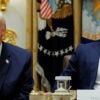House Democrats’ impeachment managers and President Donald Trump’s lawyers made their closing cases Monday to the Senate, two days before the 100 lawmakers are scheduled to vote on whether to remove the president from office.
The day included a proposal from one Senate Democrat to censure the president rather than remove him, and the lead House prosecutor’s dire warning that Trump could give Alaska to the Russians and place his son-in-law in charge of the country.
After the House prosecutors and defense lawyers wrapped up, senators spoke from the floor. They are expected to continue doing so Wednesday after a break Tuesday in the runup to Trump’s delivery of his third State of the Union address.
Here are eight of Monday’s highlights:
1. ‘Censure Would Allow This Body to Unite’
Sen. Joe Manchin, D-W.Va., a centrist Democrat, said he is undecided but urged fellow senators to support a bipartisan resolution censuring Trump for his actions toward Ukrainian President Volodymyr Zelenskyy.
“It was not a ‘perfect call.’ A newly elected president, Zelenskyy, with no experience in international politics, gets a call from the leader of the free world asking for a favor relating to U.S. domestic political affairs,” Manchin said.
“No one, no one, regardless of political party, should think what he did was right,” Manchin said. “It was just simply wrong.”
Manchin pressed censure, an idea that has surfaced before, as the only reasonable path, given that the Constitution requires a two-thirds majority of the Senate, or 67 votes, to convict and remove a president.
“I see no path to the 67 votes,” Manchin said. “However, I do believe a bipartisan majority of this body would vote to censure President Trump for his actions in this matter. Censure would allow this body to unite across party lines.”
A bipartisan censure could ease the polarization in the country, he said.
“Never before in the history of our republic has there been a purely partisan impeachment vote [against] a president,” Manchin said. “Removing this president at this time would not only further divide our deeply divided nation, but also further poison our already-toxic political atmosphere.”
2. ‘Rush to Judgment’
One of the president’s lawyers, Ken Starr, invoked Abraham Lincoln and Martin Luther King Jr. in making an argument for justice on behalf of Trump’s acquittal.
“Dr. King spoke not only about freedom, freedom standing alone. He spoke frequently about freedom and justice,” Starr told senators.
Starr went on to criticize the impeachment process followed in the House.
“Did the [House] Judiciary Committee rush to judgment in fashioning the articles of impeachment?” he asked. “Did it carefully gather the facts [and] assess the facts before it concluded we need nothing more than a panel of very distinguished professors and the splendid presentations by both the majority counsel and the minority counsel?”
Starr then spoke as if he were the House’s Democratic majority.
“We asked some questions. The Republicans asked some questions. We heard their answers. We’re ready to vote,” he said, framing the Democrats’ actions. “We are ready to try this case in the high court of impeachment.”
“What was being said in the sounds of silence was this: We don’t have time to follow the rules.”
In House impeachment inquiries targeting Presidents Richard Nixon and Bill Clinton, lawyers for those presidents had the opportunity to cross-examine witnesses and the minority party was able to call witnesses—both part of House impeachment rules.
“Oh, yes, that is expressly provided for in the rules. We’ll break those rules,” Starr said, mimicking Democrats.
He added: “That’s not liberty and justice for all.”
Starr, who as independent counsel played a key role in the unpopular impeachment of Clinton in 1998, talked about the completely partisan aspect of the current impeachment:
In the fast-track impeachment process in the House of Representatives, did the House majority persuade the American people? Not just partisans?
Rather, did the House’s case win over the overwhelming consensus of the American people? The question fairly to be asked: Will I cast my vote to convict and remove the president of the United States when not a single member of the president’s party—the party of Lincoln—was persuaded at any time in the process?
In contrast, when I was here last week, I noted for the record of these proceedings that in the Nixon impeachment, the House vote to authorize the impeachment inquiry was 410-4. And the Clinton impeachment, divisive, controversial, 31 Democrats voted in favor of the impeachment inquiry. Here, of course, [in] a sharp contrast, the answer is none [from the other party].
Moreover, Starr contended, Democrats’ push to remove Trump undermined the rights of voters.
“Your vote in the last election is hereby declared null and void, and by the way, we are not going to allow you—the American people—to sit in judgment on this president and his record in November,” Starr said. “That is neither freedom nor is it justice. It certainly is not consistent with our most basic freedom of ‘We the People’ and the freedom to vote.”
3. ‘Trump Could Offer Alaska to the Russians’
Rep. Adam Schiff, D-Calif., who has led the House managers in their prosecution, scoffed at defense arguments that a crime is required for impeachment.
During the impeachment process, Schiff became known for what he defended as a parody in mischaracterizing the July 25 phone call and for offering scenarios such as former President Barack Obama seeking Russian dirt on his 2012 opponent Mitt Romney, now a Utah senator.
During the closing argument, he presented another couple of far-fetched scenarios that could occur if Trump isn’t removed from office.
“If abuse of power is not impeachable, even though it’s clear the Founders considered it the highest of all high crimes and misdemeanors, but if it were not impeachable, then a whole range of utterly unacceptable conduct in a president would now be beyond reach,” Schiff said, adding:
Trump could offer Alaska to the Russians in exchange for support in the next election or decided to move to Mar-a-Lago permanently and let [son-in-law] Jared Kushner run the country, delegating to him the decision about whether to go to war.
Because those things are not necessarily criminal, this argument would allow that he could not be impeached for such abuses of power. Of course this would be absurd. More than absurd, it would be dangerous.
4. ‘Enough to Prove Extortion’
Rep. Val Demings, D-Fla., a former Orlando police chief, said Trump was clearly guilty of extortion.
The House’s two articles of impeachment against the president do not allege a crime, or any specific violation of the law, which extortion would be.
House Democrats voted Dec. 18, without a single Republican vote, to impeach Trump for abuse of power and obstruction of Congress. They based the two articles of impeachment on Trump’s July 25 phone call to Ukraine’s Zelenskyy and the president’s refusal to allow certain executive branch witnesses or provide certain documents for House hearings.
According to a White House transcript of the Trump-Zelenskyy call, released by the president, the two leaders briefly talked about Trump’s interest in Ukraine’s investigating former Vice President Joe Biden’s dealings there and the role of his son, Hunter Biden, on the board of Ukrainian energy firm Burisma.
Trump also asked Zelenskyy to look into whether Ukraine interfered in the 2016 U.S. election.
Zelenskyy apparently did not know at the time that Trump had put a hold on $391 million in congressionally approved military aid to Ukraine to help it counter Russia’s invasion. Trump would release the funds in September.
House Democrats allege that Trump withheld the military aid to pressure Zelenskyy into initiating politically motivated investigations.
Demings said she was skeptical of the Trump defense team’s assertion that Ukraine’s government did not know the president had put a hold on U.S. military aid until it was publicly reported Aug. 28 by Politico.
Nevertheless, she noted, the Ukrainian government was aware before a United Nations General Assembly meeting in September, when Zelenskyy was expected to use a CNN interview to announce investigations of the Bidens’ connections with Burisma and alleged Ukrainian interference in a U.S. election.
“No one can dispute, even after the hold became public … on Aug. 28, President Trump’s representatives continued their efforts to secure Ukraine’s announcement of the investigations,” Demings said. “This is enough to prove extortion in court. It is certainly enough to prove it here.”
During the course of the Senate trial, House Democrats also have raised the issue of Trump’s attempting to violate campaign finance laws if the investigations are seen as things of value, as well as a Government Accountability Office report finding that Trump violated a specific federal law in holding the aid to Ukraine.
Neither was included in the two articles of impeachment.
Demings said that reported allegations in a forthcoming book by Trump’s former national security adviser, John Bolton, that Trump pushed him to work on Ukraine with the president’s personal lawyer, Rudy Giuliani, was further evidence of a crime.
“Reports about Ambassador Bolton’s account, soon to be available if not to this body, then to bookstores near you, [say] the president also unsuccessfully tried to get Bolton to call the new Ukrainian president to ensure he would meet with Giuliani,” Demings said, adding:
The desire for Ukraine to announce these phony investigations was for a clear and corrupt reason because President Trump wanted the political benefit of a foreign country announcing it would investigate his rival. That is how we know without a doubt that the object of the president’s scheme was to benefit his reelection campaign. In other words, to cheat in the next election.
What Demings called “phony investigations” were of matters widely reported before Giuliani got involved in inquiries on Trump’s behalf.
The New York Times, The Washington Post, The New Yorker, and other news outlets published stories well in advance of Giuliani’s inquiries about a potential conflict of interest regarding Hunter Biden’s role on the board of Ukraine energy company Burisma from 2014 to 2019, which reportedly paid him $83,000 per month.
Politico reported in 2017 about efforts by Ukrainian officials to meddle in the 2016 U.S. presidential election to help Hillary Clinton, Trump’s Democratic rival.
5. Invoking Barry Goldwater
Rep. Jason Crow, D-Colo., one of the seven House impeachment managers, talked about the effort by then-Sen. Barry Goldwater, R-Ariz., to persuade Nixon to resign over the Watergate scandal.
“In May of 1974, Barry Goldwater and other Republican congressional leaders went to the White House to tell President Nixon it was time for him to resign, that they could no longer hold back the tide of impeachment over Watergate,” Crow said.
Nixon, who was more liberal than Goldwater, resigned that August, months after the Arizona Republican pressed him to do so.
“Contrary to popular belief, the Republican Party did not abandon Nixon as the Watergate scandal came to light. It took years of disclosures and crisis and court battles,” said Crow, a former Army Ranger. “The party stood with Nixon through Watergate because he was a popular conservative president and his base was with him. So, they were too. But ultimately, as Goldwater would tell Nixon: ‘There are only so many lies you can take, and now there has been one too many.’”
In fact, that quote is attributed to Goldwater in discussions with other Senate Republicans, not in a meeting with Nixon.
6. ‘Cheapened Awesome Power of Impeachment’
Trump personal lawyer Jay Sekulow played a video of just over one minute showing numerous Democrats, going back to Jan. 15, 2017—five days before Trump was inaugurated—giving speeches and interviews calling for his impeachment.
They included Rep. Al Green, D-Texas, who said “I’m concerned if we don’t impeach this president, he will get reelected,” and Rep. Rashida Tlaib, D-Mich., who said, “We’re going to impeach the motherf—–.”
“One of the members of the House of Representatives said we’re bringing these articles of impeachment so he doesn’t get elected again. Here we are 10 months before an election doing exactly what they predicted,” Sekulow said, adding:
The whistleblower’s lawyer, Mr. [Mark] Zaid, sent out a tweet on Jan. 30, 2017—let me put that up on the screen: ‘The coup has started. First of many steps. Rebellion. Impeachment will follow ultimately.’ And here we are.
What the House managers have forced upon this great body is unprecedented and unacceptable. This is exactly and precisely what the Founders feared. This is the first totally partisan presidential impeachment in our nation’s history, and it should be our last. What the House Democrats have done to this nation, to the Constitution, to the office of the president, to the president himself, and to this body is outrageous. They have cheapened the awesome power of impeachment. Unfortunately, the country is not better for that.
7. ‘Lives Have Been Put at Risk’
Schiff said his staffers have faced death threats for their work on the case.
“I want to say something about the staff who have worked tirelessly on the impeachment inquiry for months now,” Schiff said. “There is a small army of public servants down the hall from this chamber in offices throughout the House and, yes, in that windowless bunker in the Capitol, who have committed their lives to this effort, because they, like the managers and the American people, believe that a president free of accountability is a danger to the beating heart of our democracy.”
Schiff named more than 20 staffers, including Sean Misko, who reportedly was closely associated with the anonymous whistleblower who complained about the Trump-Zelenskyy phone call.
“Some of those staff, including some singled out in this chamber, have been made to endure the most vicious, false attacks to the point where they fear their lives have been put at risk,” Schiff said.
The California Democrat called for senators to vote to remove Trump from office, which under the Constitution requires the votes of 67 of the 100 senators.
“He has betrayed our national security and he will do so again. He has compromised our elections and he will do so again,” Schiff said, adding: “Truth matters little to him. What’s right matters even less, and decency matters not at all.”
8. ‘Overturn’ and ‘Interfere‘
White House counsel Pat Cipollone opened the defense’s closing argument, stating that the Democrats were attempting to undermine two presidential elections, one in 2016 and one in 2020.
“The key conclusion, we believe the only conclusion, based on the articles of impeachment themselves, and the Constitution, is that you must vote to acquit the president,” Cipollone told senators. “At the end of the day, this is an effort to overturn the results of one election and to try to interfere in the coming election that begins today in Iowa.”
Cipollone stressed an important standard for impeachment.
“We believe that the only proper result—if we are applying the golden rule of impeachment, if we are applying the rules of impeachment that were so eloquently [described] by members of the Democratic Party the last time we were here—the only appropropriate result here is to acquit the president and to leave it to the voters to choose their president,” he said.
Ken McIntyre contributed to this report.
***
Other coverage of the impeachment trial for The Daily Signal by White House correspondent Fred Lucas includes:
4 Big Moments Before the Senate’s Vote Against New Impeachment Witnesses
7 Questions and Answers From Day 9 of Trump Impeachment Trial
6 Scenes From Day 8 of Trump Impeachment Trial
‘Danger, Danger, Danger’: 4 Highlights From Final Day of Defense Arguments in Impeachment Trial
Under Bolton Shadow, 6 Big Moments From Day 6 of Trump Impeachment Trial
5 Big Points by Trump’s Lawyers as Defense Opens in Impeachment Trial
7 Big Moments in Democrats’ Final Arguments to Remove Trump
7 Highlights From Day 3 of the Trump Impeachment Trial































One Reply to “8 Highlights of Closing Arguments Before the Final Impeachment Vote”